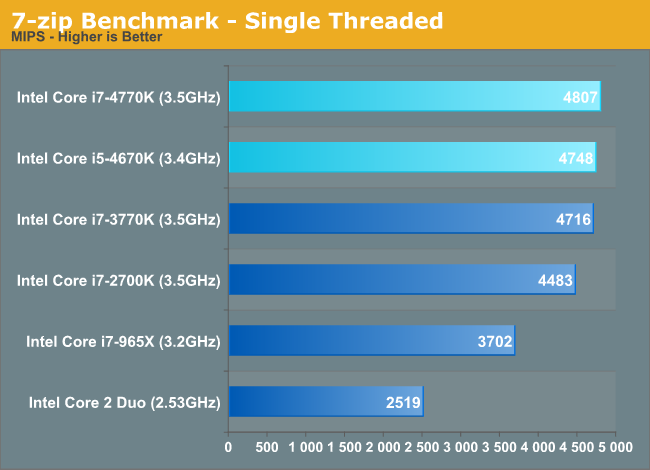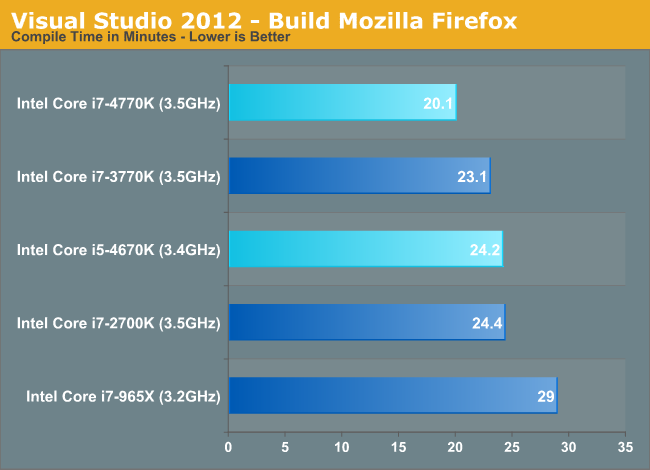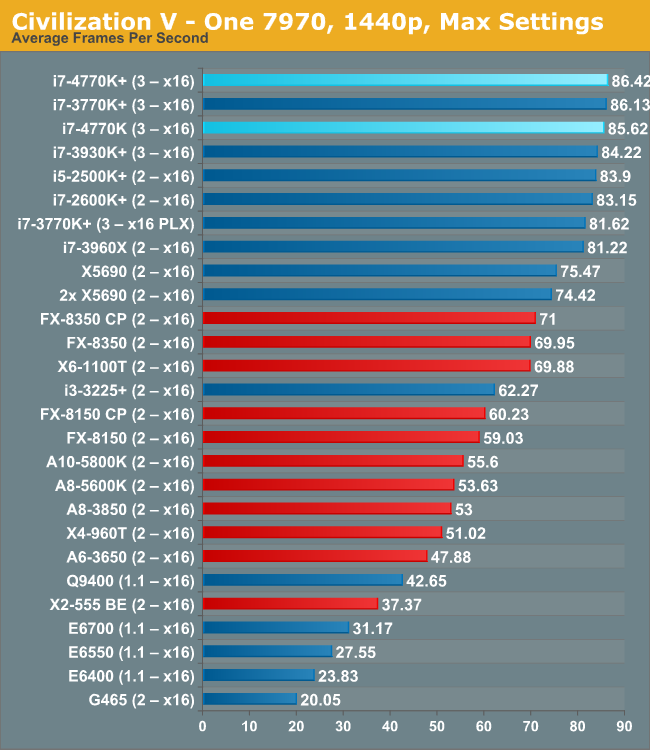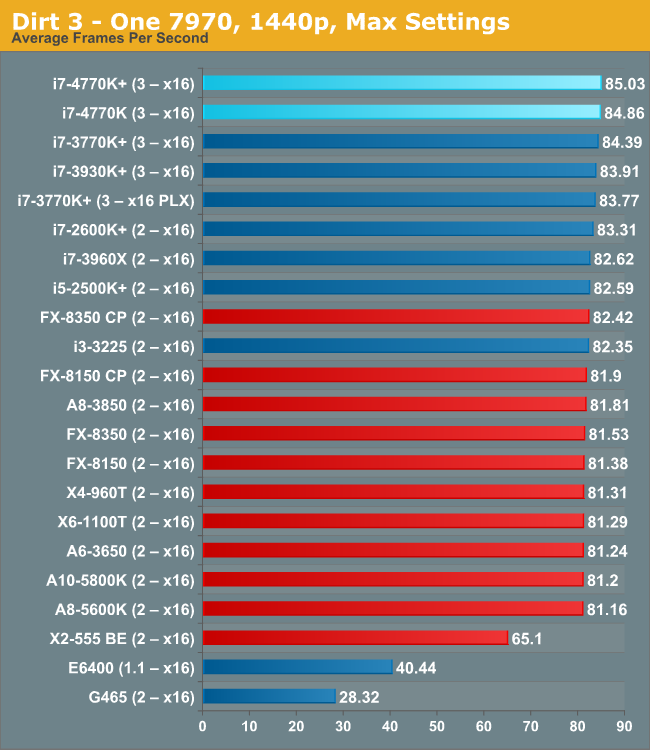The Haswell Review: Intel Core i7-4770K & i5-4670K Tested
by Anand Lal Shimpi on June 1, 2013 10:00 AM ESTCPU Performance: Five Generations of Intel CPUs Compared
For the purposes of our look at Haswell, we will be breaking up our review coverage into two parts. The rest of this article will focus on the CPU side of Haswell, while coverage of the GPU - including Iris Pro and Crystalwell - has been spun off into another artice: Intel Iris Pro 5200 Graphics Review: Core i7-4950HQ Tested.
The majority of the market doesn’t upgrade annually, so I went back a total of five generations to characterize Haswell’s CPU performance. Everything from a 2.53GHz Core 2 Duo through Nehalem, Sandy Bridge, Ivy Bridge and Haswell are represented here. With the exception of the Core 2 platform, everything else is running at or near the peak launch frequency for the chip.
In general, I saw performance gains over Ivy Bridge of 1 - 19%, with an average improvement of 8.3%. Some of the performance gains were actually quite impressive. The 7.8% increase in Kraken shows there’s still room for improvement in lightly threaded performance, while the double digit FP performance gains in POV-Ray and x264 HD really play to Haswell’s strengths.
Compared to Sandy Bridge, Haswell looks even more impressive. The Core i7-4770K outperforms the i7-2700K by 7 - 26%, with an average performance advantage of 17%. The gains over Sandy Bridge aren’t large enough to make upgrading from a Sandy Bridge i7 to a Haswell i5 worthwhile though, as you still give up a lot if you go from 8 to 4 threads on a quad-core part running heavily threaded workloads.
Compared to Nehalem the gains average almost 44%.











Quite possibly the most surprising was just how consistent (and large) the performance improvements were in our Visual Studio 2012 compile test. With a 15% increase in performance vs. Ivy Bridge at the same frequencies, what we’re looking at here is the perfect example of Haswell’s IPC increases manifesting in a real-world benchmark.
Gaming Performance
After spending far too much time on the Iris Pro test system, I didn’t have a ton of time left over to do a lot of gaming performance testing with Haswell. Luckily Ian had his gaming performance test data already in the engine, so I borrowed a couple of graphs.
As expected, Haswell is incrementally quicker in GPU bound gaming scenarios compared to Ivy Bridge - and most definitely at the top of the charts.












210 Comments
View All Comments
JDG1980 - Saturday, June 1, 2013 - link
Those tests you linked are purely synthetic benchmarks. Has anyone found a significant real-world application where Haswell is slower than SB/IB at the same clock speed?krumme - Saturday, June 1, 2013 - link
Has anyone found a significal real-world application where Haswell matter?smilingcrow - Saturday, June 1, 2013 - link
Has anyone found a significant real-world comment from you that matters?rupert3k - Saturday, June 1, 2013 - link
*high fives*Aditya211935 - Sunday, June 2, 2013 - link
http://www.techoftomorrow.com/2013/pc/intel-haswel...This One is pretty nice.
Altough the list of games given there is a bit shallow but still it gives you a general idea.
jeffkibuule - Saturday, June 1, 2013 - link
Haswell isn't just about the CPU, it's about the entire platform of chips, even the tiny ones on the motherboard no one really cares about. And I'm not sure what you were expecting in terms of performance gains, as there isn't any competition in the desktop arena for it to be worth pushing out 20-25% gains (and certainly not on a yearly basis).As far as active power goes, the entire point of a modern CPU architecture is to "hurry up and go to sleep (HUGS)". Faster you go to idle and the better idle performance you have, the better battery life you get because lets face it, unless you're encoding a video or playing a game, your CPU spends most of its idling doing nothing.
B3an - Saturday, June 1, 2013 - link
You're right. If anyone is to be blamed for the slight performance increase of Haswell, it's AMD. If AMD could actually compete on performance we would be seeing more gains with Haswell, and maybe FINALLY more than 4 cores on mainstream Intel platforms.DeadlyRicochet - Tuesday, June 4, 2013 - link
And I wonder how successful AMD would have been if Intel never stole their revenue (when AMD chips were faster than Intel, around 2006) by making under the table deals with OEMs to use Intel only CPUs.deepblue08 - Saturday, June 1, 2013 - link
I disagree somewhat. Especially with the fact that you think idle power consumption is unimportant. Keep in mind, that at least half of the time, when you are working, browsing the net, your cpu is in fact idle. So an improvement in idle performance consumption is a big deal imo.Hector2 - Saturday, June 1, 2013 - link
You've got it all wrong. Haswell won't be going up against ARM in tablets. Don't look for it in smartphones either ! LOL A Haswell i7 is serious overkill for those markets. ARM won't be getting into the serious laptop & PC market soon either --- they just can't compete well with Intel there. Intel is targeting their smaller & less power-hungry Atoms for the phone & tablet markets (surely you know this ?) that are driven by low power requirements. The press just leaked that Samsung's new Galaxy Tab 3 will have dual core Clover Trail+ Atoms